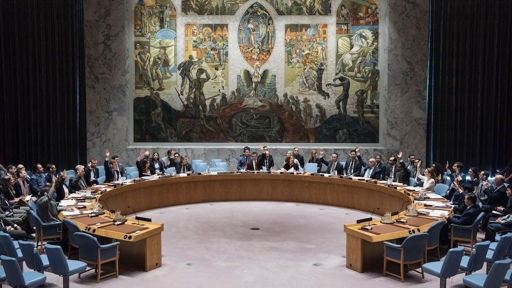On the evening of Monday, November 17, the United Nations Security Council adopted a draft resolution presented by the United States, which, among other things, stipulates the deployment of an international force in Gaza. The vote passed with 13 votes in favor and abstentions from Russia and China.
The draft resolution represents the second phase of a 20-point plan brought forward by US President Donald Trump on September 29, to end Israel’s two-year genocidal aggression on Gaza.
The first phase of the plan consisted of a temporary ceasefire in Gaza (which was violated by Israel on a daily basis and killed 2,000 more Palestinians), a prisoners-for-captives swap deal, the entry of humanitarian aid to the besieged enclave, and the partial withdrawal of the Israeli Occupation Forces (IOF) to agreed upon lines.
Meanwhile, the second phase outlines Trump’s vision to achieve an alleged “permanent peace” in the besieged Gaza Strip, by placing it under the mandate of what he called the International Stabilization Force (ISF), and the “Board of Peace”, an international transnational body which the US president is looking forward to leading personally.
The plan also stipulated the disarmament of Palestinian resistance factions, above all Hamas, as a primary requirement, while hinting at the possibility of establishing a Palestinian state, once the Palestinian Authority has completed “reforms”.
Trump’s plan had already been endorsed by Arab and Islamic governments known for their allegiance to the United States, including the Palestinian Authority (PA), during the Sharm El-Sheikh summit in October. Many Palestinians inside the occupied territories and in the diaspora oppose the PA and consider it a totalitarian regime, because elections have not been held since 2006.
The resolution does not reflect the opinion of the majority of Palestinian people, who consider Trump’s plan a blatant violation of their inalienable right to self-determination.
US resolution seeks to entrench the denial of Palestinian self-determination, says Al-Haq
Commenting on this particular aspect of the resolution, Palestinian human rights organization Al-Haq said in a statement on Monday:
“The Palestinian right to self-determination cannot be subjected to unlawful conditionality. At the core of the draft resolution lies the “Comprehensive Plan to End the Gaza Conflict” (the “20-point plan”) as announced by US President Donald Trump in late September 2025. In essence the draft conditionalizes the suspension of Israel’s ongoing genocidal attacks and mass slaughter of Palestinians in Gaza, on a set of unilateral terms dictated by the USA.”
Al-Haq affirmed that the right to self-determination encompasses “territorial integrity, the right of a people to freely determine its political status and pursue economic, social and cultural development and the protection against acts aimed at dispersing the population and undermining its integrity as a people.”
The Palestinian human rights group accused the United States of contravening this right via Trump’s “Gaza Peace Plan”, which “seeks to entrench the denial of self-determination” and further fragment the Palestinian people by isolating Gaza and placing it under a “revised form of alien occupation”.
Palestinian factions reject the US resolution, consider it a violation of national sovereignty
Anticipating the UNSC voting session, Palestinian resistance factions issued a joint statement on Sunday, November 16, rejecting the US draft resolution.
The Palestinian groups described the US proposal as dangerous as it paves the way for imposing “foreign guardianship over the Palestinian territory, and external dominance over the national decision-making.”
They also pointed out that Trump’s plan suggests assigning a “supranational body with wide authority” to handle Gaza’s administration and reconstruction, which in turn would “strip Palestinians of their right to govern their own affairs”.
The Palestinian factions insisted that the US draft resolution “represents, under various titles, a new attempt to impose another form of occupation” on the Palestinian land and people, and to “legitimize foreign trusteeship over the future of the Palestinian cause.”
They also warned of “political and security-based employment of Gaza-bound aid, that would “turn it into a pressure and blackmail tool under foreign administration, and use it to re-engineer the reality in Gaza.”
The statement stressed that the implementation of any foreign-run humanitarian aid delivery mechanism would undermine both the Palestinian institutions and the United Nations Relief and Works Agency for Palestine Refugees (UNRWA), whose role “must be protected as an international witness to the refugee issue and their inalienable rights.”
Moreover, the factions reiterated their rejection of any provision indicating “the disarmament of Gaza or the infringement of the Palestinian people’s right to resist and defend themselves”, emphasizing that it is an inalienable and internationally guaranteed right.
The Palestinian resistance groups noted that any discussion related to arms should remain a national internal matter associated with a political process, which ensures the end of occupation, the establishment of a Palestinian state, and maintaining the right to self-determination.
Hamas: international force with tasks and roles inside Gaza would become a party to the conflict
The Palestinian resistance movement Hamas voiced its rejection of the UN Security Council’s passing of the US draft resolution in the early hours of Tuesday, November 18.
Hamas stated that the resolution “fails to meet Palestinians’ rights and demands, favors the Israeli occupation, and seeks to impose an international trusteeship on the enclave that Palestinians and resistance factions oppose.”
The movement warned that “assigning the international force with tasks and roles inside the Gaza Strip, including disarming the resistance, strips it of its neutrality, and turns it into a party to the conflict in favor of the occupation.”
The post UNSC adopts draft resolution on Trump’s Gaza “peace plan” appeared first on Peoples Dispatch.
From Peoples Dispatch via this RSS feed


